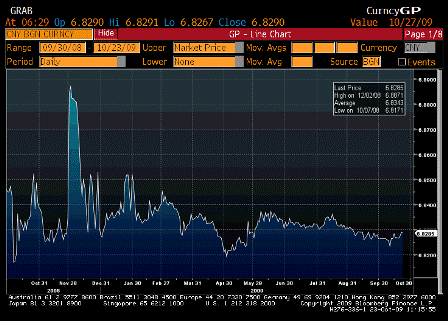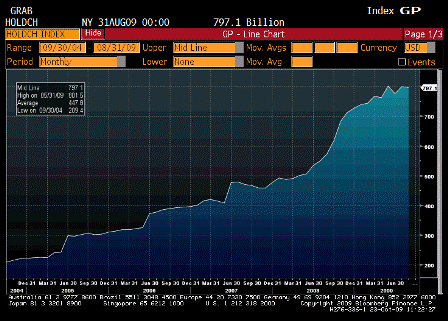[Skip to the end]
CENTER FOR ECONOMIC AND POLICY RESEARCH
________________________________________
Does Citigroup Need China?
By Dean Baker
Most of the economists and pundits who could not see an $8 trillion housing bubble are telling us that the United States desperately needs for the Chinese government to keep buying its debt. This crew of failed analysts argues that without the support of the Chinese government, interest rates in the United States will rise, choking off the recovery. In reality, the decision by China to stop buying U.S. government debt may not harm the economy’s recovery, but it could be devastating to the recovery efforts at Citigroup and other basket case banks.
The basic logic is simple. China’s central bank has been buying up huge amounts of dollar-based assets for the last decade. Their purchases include short and long-term government debt, mortgage backed securities, and, to a lesser extent, private assets.
The Chinese central bank’s purchases have two effects. First, they help to keep interest rates low. This supports economic growth by keeping down the interest rate on mortgages, car loans, and other borrowing that boosts demand.
Interest rates are lower than otherwise only if China’s maturity preference is longer than that of who would otherwise have the excess balances and buy treasury securities. And most of what they buy is probably short term and therefore has little influence on rates.
The other effect of China’s purchase of dollar-based assets is that it keeps down the value of its currency against the dollar. This is the famed currency “manipulation,” that draws frequent complaints from politicians. Of course, it is not exactly manipulation. China has an explicit policy of keeping down the value of its currency against the dollar. It is not buying up hundreds of billions of dollars of U.S. assets in the dark of night. It does it in broad daylight in order to keep its currency at the targeted rate.
Right. They keep their currency down to keep their domestic real wages low enough to be ‘competitive.’
Suppose China stopped buying up U.S. government debt. Interest rates in the U.S. would rise,
Very little, if any.
which would have some negative impact on growth.
Very small impact, if any.
Of course, the Fed could try to offset this rise in rates by simply buying more debt itself. It has already been buying debt and it could simply buy enough to replace the lost demand from China. This would leave interest rates largely unchanged.
Yes, any time the Fed wants tsy rates lower it can simply buy them in sufficient quantities to keep rates at their desired target rate.
Suppose that the Fed doesn’t intervene and lets interest rates rise.
A few basis points.
This will have some negative impact on growth,
Tiny
but there will also be a very positive side effect from China’s decision to stop buying dollars. The dollar would fall in value against China’s currency. This would make Chinese goods more expensive in the United States, leading U.S. consumers to purchases fewer imports from China and more domestically produced goods.
Yes, which reduces our standard of living.
Imports are real benefits, exports real costs.
A lower-valued dollar would also make our exports cheaper in China. That would allow us to export more to China.
Right, we work and produce goods and services but instead of consuming them domestically we send them to china for them to consume. We become the world’s slaves instead of China.
The net effect would be an improvement in our trade balance,
The number goes towards positive, but that’s not ‘improvement’ from a US standard of living point of view.
bringing back some of the 5.5 million jobs that we’ve lost in manufacturing over the last decade.
We can sustain domestic demand at full employment levels with fiscal policy, such that there is sufficient demand for us to buy all we produce plus whatever the rest of world wants to send us.
And fewer manufacturing jobs means people in the us are free to produce other real goods and services for domestic consumption. It’s all a matter of sustaining domestic demand with the right fiscal adjustments.
In fact, since nearly all economists agree that the current trade deficit can’t persist for long, China would be helping the country bring about a necessary adjustment if it stopped buying up dollars.
Its their loss and our gain. Why should we work to kill the goose that’s laying the golden eggs for us?
Even the rise in interest rates would have a positive effect since it would allow for the completion of the deflation of the housing bubble, with house prices finally settling back to their trend levels. This drop in house prices will be a painful adjustment, but there is no way to avoid it.
How about supporting incomes through a full payroll tax holiday, and a $500 per capita revenue distribution to the states, and a federally funded $8/hr job for anyone willing and able to work
To use an employed labor buffer stock rather than an unemployed labor buffer stock as a price anchor.
Bubbles cannot be sustained indefinitely and we are better off allowing the housing market to return to normal so we can get back to a path of sustainable growth.
Sustaining incomes on a moderate 3% growth path rather than the current -3% path personal income is now on will work wonders for stabilizing the housing markets, and fixing the banks as well from the bottom up, as the bad loan problem improves due to falling delinquencies. Instead, the govt has been using top down funding of the banks that has resulted in delinquencies continuing to rise.
While the decision of the Chinese to stop buying dollars might be good for the economy,
Only because we do not understand the monetary system sufficiently to know how to sustain domestic demand.
it is likely to be disastrous for Citigroup and the rest of the basket case banks. If interest rates rose, then the value of the government bonds they hold would plummet. If the interest rate on 10-year Treasury bonds goes from the current 3.5 percent to a still-low 4.5 percent, then the banks will have lost 8 percent on their holdings. At a 5.5 percent interest rate, a rate that would still be far below the average for the 90s, the loss would be 15 percent. Citi and the other basket cases could not endure these losses in their current financial state.
Only if they currently have a maturity mismatch, which is not permitted by regulation. Bank regulators and supervisors get ‘gap’ reports for the banks to make sure they aren’t taking that kind of interest rate risk. If they are it’s a violation that the regulators need to put an end to.
This could be why we see shrill pronouncements from the likes of the Washington Post editors, and other “experts” who couldn’t see an $8 trillion housing bubble, that we need the Chinese government to keep buying up our debt.
Not likely the reason they think we need China to buy our debt.
We absolutely do not need the Chinese government to keep buying U.S. debt and would almost certainly be better off if it stopped tomorrow. Citigroup and the other big banks do need the Chinese government to keep the money flowing if they are to have a chance of getting back on their feet.
‘Money flowing’ has nothing to do with interest rates. The fed can set the risk free rate at whatever level it wants to.
And we know where the sympathies of the Washington Post’s editors and other “experts” lie.
— This article was published on October 19, 2009 by the Guardian Unlimited [http://www.guardian.co.uk/commentisfree/cifamerica/2009/oct/19/china-us-economy-debt].
________________________________________
Dean Baker is the co-director of the Center for Economic and Policy Research (CEPR). He is the author of Plunder and Blunder: The Rise and Fall of the Bubble Economy. He also has a blog on the American Prospect, “Beat the Press”, where he discusses the media’s coverage of economic issues.
The Center for Economic and Policy Research is an independent, nonpartisan think tank that was established to promote democratic debate on the most important economic and social issues that affect people’s lives. CEPR’s Advisory Board includes Nobel Laureate economists Robert Solow and Joseph Stiglitz; Janet Gornick, Professor at the CUNY Graduate Center and Director of the Luxembourg Income Study; Richard Freeman, Professor of Economics at Harvard University; and Eileen Appelbaum, Professor and Director of the Center for Women and Work at Rutgers University.
[top]



